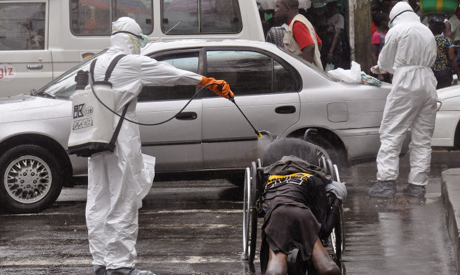
File Photo: A health workers as they spray the body of a amputee suspected of dying from the Ebola virus with disinfectant, in a busy street in Monrovia, Liberia, Tuesday, Sept. 2, 2014 (Photo: AP)
Tropical disease experts in Sierra Leone scrambled Friday to investigate a new suspected death from Ebola announced just hours after west Africa celebrated halting the spread of the deadly virus.
A 22-year-old female student was taken ill near the Guinean border and died three days ago, with an initial swab testing positive for Ebola, health officials said.
"The victim was taken ill when she was on holidays in Bamoi Luma and was taken to Magburaka, where her relatives took her to the government hospital for medical attention," district medical officer Augustine Junisa told reporters.
"Three days later she died at home and her death was reported to the hospital officials and an initial swab test was taken which proved positive" on Thursday.
Junisa said further tests would be carried out on Friday and appealed to the public in the area to remain calm.
The WHO had said Thursday a two-year Ebola epidemic that killed more than 11,000 people and triggered a global health alert was over, with Liberia the last country to get the all-clear.
Residents in the Magburaka, a town of around 40,000 people and the capital of the Tonkolili district, expressed their shock and distress over the announcement.
"It was not expected and came at a time when we had thought that the virus is nowhere within our land," groundnut farmer Allieu Kamara told AFP.
"We are really worried that death has resulted from the case but we are hopeful that the huge presence of the various key players will bring back confidence to all of us."
The deadliest outbreak in the history of the feared tropical virus wrecked the economies and health systems of the three worst-hit west African nations after it emerged in southern Guinea in December 2013.
Sierra Leone was declared free of Ebola transmission on November 7 last year and Guinea on December 29.
At its peak, it devastated Guinea, Liberia and Sierra Leone, with bodies piling up in the streets and overwhelmed hospitals recording hundreds of new cases a week.
Rick Brennan, the World Health Organization's chief of emergency risk management, hailed the milestone but told reporters in Geneva that "the job is still not done", pointing out that there had already been 10 small flare-ups because of the persistance of the virus in survivors.
UN chief Ban Ki-moon also warned the region can expect sporadic cases in the coming year but added "we also expect the potential and frequency of those flare-ups to decrease over time".
Liberia, the country worst hit by the outbreak with 4,800 deaths, discharged its last two patients from hospital -- the father and younger brother of a 15-year-old victim -- on December 3, 2015.
Africa's oldest republic was the last country still afflicted by the outbreak that infected almost 29,000 people and claimed 11,315 lives, according to official data.
The real toll is suspected to be much higher, with many Ebola deaths believed to have gone unreported.
After the last patient is declared in the clear, a 42-day countdown -- twice the incubation period of the virus -- begins before the country is proclaimed Ebola-free.
Ebola causes severe fever and muscle pain, weakness, vomiting and diarrhoea. In many cases it shuts down organs and causes unstoppable internal bleeding. Patients often succumb within days.
From a Guinean infant who was the first victim, the epidemic quickly spread into neighbouring Liberia and Sierra Leone, notching up more deaths than all other Ebola outbreaks combined.
Liberia was first to be declared free of human-to-human Ebola transmission in May, only to see the virus resurface six weeks later.
It was officially credited with beating the epidemic for a second time in September before another small cluster of cases emerged.
Reaction to Thursday's announcement was muted in the capital Monrovia, where locals have become accustomed to good news on Ebola being followed by setbacks, and there was no official programme of celebration.
Short link: